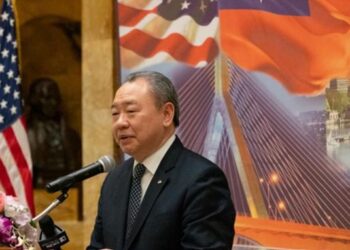China’s Bold Missile Test Signals a New Era of Nuclear Capabilities
In a striking demonstration of military advancement, Captain James Fanell revealed that the Chinese Communist Party (CCP) conducted its first intercontinental ballistic missile (ICBM) test launch into the Pacific Ocean in 44 years. This significant event occurred on a Wednesday morning at approximately 8:45 AM Beijing time. The missile, boasting an impressive range of 12,000 kilometers—equivalent to over 7,500 miles—represents a serious escalation in China’s strategic capabilities.
Fanell elaborated on the details of the launch on the WarRoom program on Wednesday, highlighting that it involved a three-stage rocket. The missile’s trajectory bracketted Luzon, a critical area in the region, underscoring the test’s strategic implications. This action sends a clear and unambiguous message regarding the CCP’s determination to enhance its nuclear arsenal amidst ongoing global tensions.
The implications of this missile test are profound. In the last three years alone, China has reportedly constructed over 300 nuclear ICBM silos in Central and Western China. Coupled with advancements in their submarine-launched ballistic missile capabilities, this signifies a notable strategic breakout. Despite Beijing’s continued claims of adhering to a ‘no first use’ policy regarding nuclear weapons, these developments raise questions about the true nature of their intentions and commitment to nuclear deterrence.
As the global community watches closely, this missile launch serves as a stark reminder of the shifting balance of power in the Pacific and the growing military ambitions of the CCP. With such advancements, the stakes in the region have never been higher, making international dialogue and strategic planning more critical than ever.
Democrat Vice President Candidate is a Friend of the Communists
The rise of the Chinese Communist Party (CCP) poses a complex and multifaceted threat to the United States, one that includes both the aggressive expansion of their missile capabilities and the subtle infiltration of American politics. This analysis reveals the unexpected dangers posed by political figures like Democrat Tim Walz, whose close ties to China may obscure the looming threats of the CCP’s military ambitions.
The CCP’s Military Threat: A Missile Launch
On September 25, 2024, the People’s Republic of China (PRC) executed a test launch of an intercontinental ballistic missile (ICBM) for the first time in 44 years. This event sent shockwaves through international defense circles. Captain James Fanell, a noted scholar, highlighted the gravity of this test, stating, "This is an unambiguous signal of the Chinese Communist Party’s commitment to fulfilling the strategic breakout of their nuclear arsenal.” The missile reportedly boasts a range of over 12,000 kilometers (about 7,500 miles) and serves as a stark reminder of China’s advancing military capabilities.
Such developments come amid reports of the CCP constructing over 300 nuclear ICBM silos and upgrading their submarine-launched ballistic missile systems. This growing arsenal is not merely a military concern; it symbolizes a broader ambition to project power globally. The implications of such military advancements extend far beyond the Pacific region, raising questions about the security of American allies and the potential for escalated tensions.
Political Connections: Tim Walz and the CCP
Compounding these military threats is the political landscape in the United States, where figures like Tim Walz, the Democratic Vice Presidential candidate, have raised eyebrows regarding their connections to China. Sam Faddis described Walz’s extensive history with China, stating, "He has traveled to China over 30 times and even married on the anniversary of the Tiananmen Square massacre.” Walz’s business dealings in China, particularly his establishment of educational exchanges, have led to scrutiny over the nature of his relationships with CCP affiliates.
Faddis criticized the narrative that Walz presents himself as an advocate for democracy while maintaining ties to a regime known for its repression, remarking, "You can’t travel to Communist China and wander around preaching democracy and liberty… and you certainly don’t get invited back.” This contradiction raises urgent questions about the potential influence of foreign powers on American political figures.
The Dangers of Complacency
The discussion between Faddis and Capt. James Fanell exposed a growing concern regarding the vulnerability of U.S. political institutions to CCP influence. Faddis pointed out that Walz’s relationships may place American students in jeopardy: "He is putting them in a position where they can be approached by Chinese intelligence services.” Such a scenario illustrates the potential risks that arise from intertwining American educational systems with foreign interests.
Moreover, Fanell emphasized the broader implications of this infiltration, stating, "The war has already started, and they’re winning.” He remarked on the urgency of addressing these threats, as complacency may result in a failure to recognize the extent of the CCP’s political warfare strategies. The CCP’s systematic approach to gaining influence over American elites has resulted in a disconnect between the reality of Chinese aggression and the perception held by many within the U.S. political sphere.
Urgent Action Required
The intersection of political naiveté and military expansion presents an alarming challenge for the United States. As figures like Tim Walz continue to navigate the complex relationship with China, it becomes increasingly vital for policymakers and citizens alike to recognize the broader implications of these relationships.
The threats posed by the CCP are not merely military but extend into the heart of American politics. As Thayer and Faddis assert, understanding these dynamics is crucial in safeguarding American interests and ensuring the nation remains vigilant against potential existential threats. The situation’s urgency demands a reassessment of current policies, emphasizing the need for a unified front against an increasingly assertive China.
For more about the threats the United States faces from Democrat candidate for Vice President, Tim Walz, watch this Wednesday WarRoom segment where the three discuss the topic:




